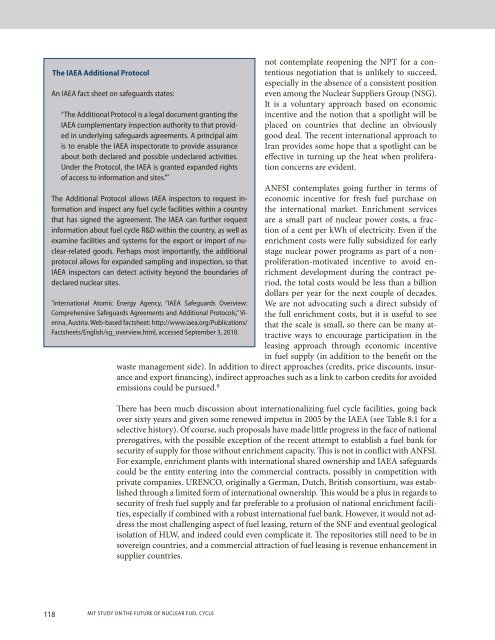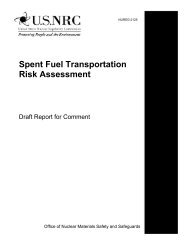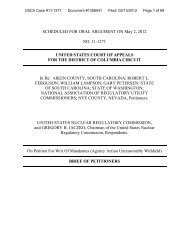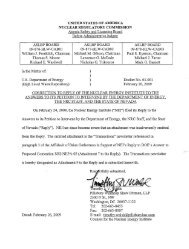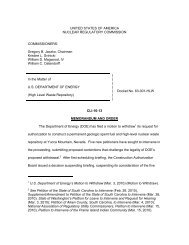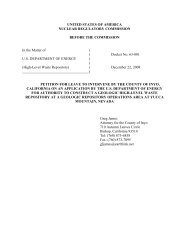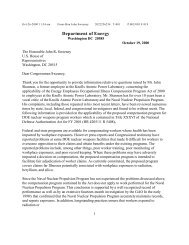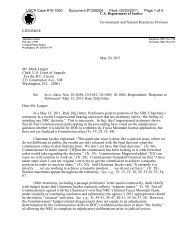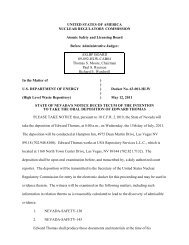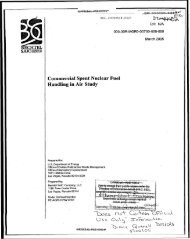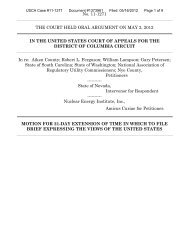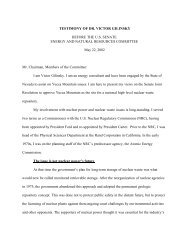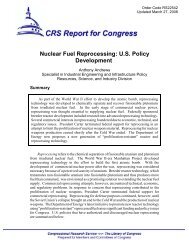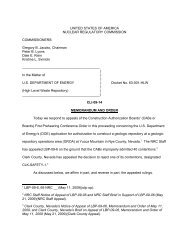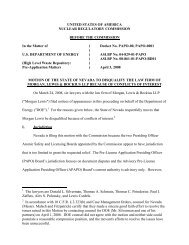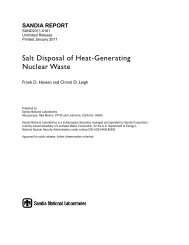The FuTure oF nuclear Fuel cycle - MIT Energy Initiative
The FuTure oF nuclear Fuel cycle - MIT Energy Initiative
The FuTure oF nuclear Fuel cycle - MIT Energy Initiative
Create successful ePaper yourself
Turn your PDF publications into a flip-book with our unique Google optimized e-Paper software.
the iaea additional protocol<br />
an Iaea fact sheet on safeguards states:<br />
“<strong>The</strong> additional Protocol is a legal document granting the<br />
Iaea complementary inspection authority to that provided<br />
in underlying safeguards agreements. a principal aim<br />
is to enable the Iaea inspectorate to provide assurance<br />
about both declared and possible undeclared activities.<br />
under the Protocol, the Iaea is granted expanded rights<br />
of access to information and sites.” *<br />
not contemplate reopening the NPT for a contentious<br />
negotiation that is unlikely to succeed,<br />
especially in the absence of a consistent position<br />
even among the Nuclear Suppliers Group (NSG).<br />
It is a voluntary approach based on economic<br />
incentive and the notion that a spotlight will be<br />
placed on countries that decline an obviously<br />
good deal. <strong>The</strong> recent international approach to<br />
Iran provides some hope that a spotlight can be<br />
effective in turning up the heat when proliferation<br />
concerns are evident.<br />
ANFSI contemplates going further in terms of<br />
economic incentive for fresh fuel purchase on<br />
the international market. Enrichment services<br />
are a small part of <strong>nuclear</strong> power costs, a fraction<br />
of a cent per kWh of electricity. Even if the<br />
enrichment costs were fully subsidized for early<br />
stage <strong>nuclear</strong> power programs as part of a nonproliferation-motivated<br />
incentive to avoid enrichment<br />
development during the contract period,<br />
the total costs would be less than a billion<br />
dollars per year for the next couple of decades.<br />
We are not advocating such a direct subsidy of<br />
the full enrichment costs, but it is useful to see<br />
that the scale is small, so there can be many attractive<br />
ways to encourage participation in the<br />
leasing approach through economic incentive<br />
in fuel supply (in addition to the benefit on the<br />
waste management side). In addition to direct approaches (credits, price discounts, insurance<br />
and export financing), indirect approaches such as a link to carbon credits for avoided<br />
emissions could be pursued. 9<br />
<strong>The</strong> additional Protocol allows Iaea inspectors to request information<br />
and inspect any fuel <strong>cycle</strong> facilities within a country<br />
that has signed the agreement. <strong>The</strong> Iaea can further request<br />
information about fuel <strong>cycle</strong> r&d within the country, as well as<br />
examine facilities and systems for the export or import of <strong>nuclear</strong>-related<br />
goods. Perhaps most importantly, the additional<br />
protocol allows for expanded sampling and inspection, so that<br />
Iaea inspectors can detect activity beyond the boundaries of<br />
declared <strong>nuclear</strong> sites.<br />
*<br />
International atomic energy agency, “Iaea Safeguards overview:<br />
comprehensive Safeguards agreements and additional Protocols,” Vienna,<br />
austria. Web-based factsheet: http://www.iaea.org/Publications/<br />
Factsheets/english/sg_overview.html, accessed September 3, 2010.<br />
<strong>The</strong>re has been much discussion about internationalizing fuel <strong>cycle</strong> facilities, going back<br />
over sixty years and given some renewed impetus in 2005 by the IAEA (see Table 8.1 for a<br />
selective history). Of course, such proposals have made little progress in the face of national<br />
prerogatives, with the possible exception of the recent attempt to establish a fuel bank for<br />
security of supply for those without enrichment capacity. This is not in conflict with ANFSI.<br />
For example, enrichment plants with international shared ownership and IAEA safeguards<br />
could be the entity entering into the commercial contracts, possibly in competition with<br />
private companies. URENCO, originally a German, Dutch, British consortium, was established<br />
through a limited form of international ownership. This would be a plus in regards to<br />
security of fresh fuel supply and far preferable to a profusion of national enrichment facilities,<br />
especially if combined with a robust international fuel bank. However, it would not address<br />
the most challenging aspect of fuel leasing, return of the SNF and eventual geological<br />
isolation of HLW, and indeed could even complicate it. <strong>The</strong> repositories still need to be in<br />
sovereign countries, and a commercial attraction of fuel leasing is revenue enhancement in<br />
supplier countries.<br />
118 <strong>MIT</strong> STudy on <strong>The</strong> <strong>FuTure</strong> <strong>oF</strong> <strong>nuclear</strong> <strong>Fuel</strong> <strong>cycle</strong>


